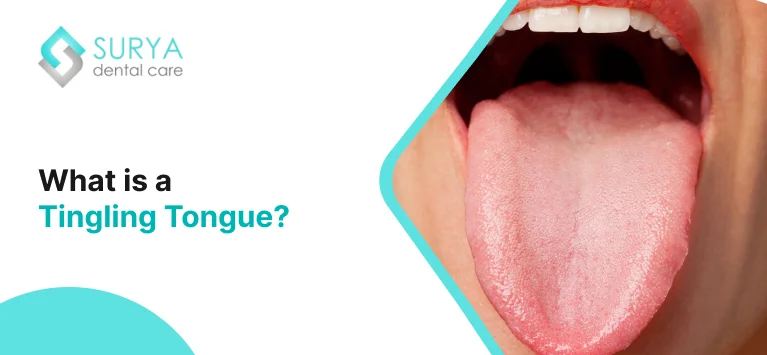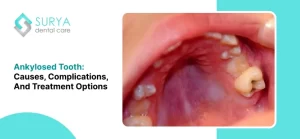The pin and needles or numb feeling can occur on your hands if you are sleeping in an awkward position and on your feet if you are seated on the ground for a longer period than usual. This feeling is called tingling, numbness, or pin and needles, which is also known as paresthesia. It can also occur in other parts of the body, including the tongue. That is called tongue tingling or tingling tongue.
This blog post explains the potential causes of the tingling tongue, if the tingling tongue is serious, and how to get rid of the tingling tongue.
Is Tingling Tongue Serious?
Tingling tongue is not a serious condition if it is caused due to harmless conditions like sleeping in an awkward position or eating certain foods. But in some cases the persistent or recurrent tingling in the tongue could indicate an underlying medical condition.
Some conditions that can lead to a tingling tongue may be more serious and could require medical treatment. For instance, neurological conditions like multiple sclerosis or a stroke can cause abnormal sensations in the tongue. In some cases, the sensation may be related to anxiety or stress. Also, vitamin deficiency, particularly of B12, can lead to tongue tingling.
Consider seeking medical attention if the sensation lasts longer, along with symptoms like difficulty swallowing, speaking, or breathing.
Why Is My Tongue Tingling?
There are several possible reasons why you might experience a tingling sensation on your tongue. Some of the most common causes are,
- Pressure on Nerves
- Vitamin Deficiency
- Allergic Deficiency
- Oral Conditions
- Neurological Disorders
- Anxiety and Stress
- Infections
Pressure on Nerves
Tingling on the tongue occurs when the nerves are compressed or irritated, like tingling on the hands and feet. This might happen if you sleep in an awkward position or apply pressure to the tongue in some way. This is a temporary condition that usually resolves once the pressure is relieved.
Vitamin Deficiency
A lack of certain vitamins, mainly vitamin B12, could lead to tingling on the tongue because vitamin B12 is crucial for maintaining the health of nerve cells. These deficiencies could lead to symptoms like numbness or tingling, especially in the tongue.
Allergic Reactions
If you recently ate something new or have a known allergy to a specific substance, then that could be the cause of a tingling tongue. Other signs of an allergic reaction, such as swelling, redness, or hives, could also accompany the tingling. Also, allergies from medication or environmental factors can cause tingling or swelling in the tongue.
Oral Conditions
Certain conditions affecting the mouth and tongue can also lead to a tingling sensation. For example,geographic tongue is a condition where patches on the tongue’s surface appear smooth and red, sometimes leading to tingling sensations, and oral thrush can also cause a tingling or burning sensation on the tongue.
Neurological Disorders
More serious neurological conditions can affect the tongue. Conditions like multiple sclerosis or a stroke can cause tingling, numbness, or weakness in the tongue. If tingling in the tongue is accompanied by other neurological symptoms, such as facial drooping, weakness, or vision problems, then it’s important to seek immediate medical attention.
Anxiety and Stress
Emotional factors such as anxiety or stress can manifest in physical symptoms, which include tingling in the tongue. People with anxiety may experience hyperventilation, which can lead to tingling or numbness in various parts of the body, including the tongue. This type of tingling usually subsides once the anxiety or stress is relieved.
Infections
Viral infections like herpes simplex can sometimes cause tingling or numbness in the tongue. Also, infections affecting the nervous system, like shingles, may cause these symptoms. If you experience tingling along with signs of infection like fever or sores then it’s important to consult a healthcare provider.
Tip of Tongue Tingling
If you are feeling tingling at the tip of your tongue, then that could point to different potential causes, as the cranial nerves primarily control the tip of the tongue. Some of the most common causes of tip of tongue tingling are,
- Burning Mouth Syndrome
- Irritation or Injury
- Nerve Damage
Burning Mouth Syndrome
This condition is characterized by a burning or tingling sensation in the tongue par, particularly at the tip. A dry mouth can accompany it and is often linked to hormonal changes, stress, or nutritional deficiencies.
Irritation or Injury
Accidental biting, scalding from hot food, or irritation from acidic foods can cause tingling at the tip of the tongue. This type of tingling is usually temporary and resolves once the irritation is gone.
Nerve Damage
In some rare cases, nerve damage can cause tingling or numbness, specifically at the tip of the tongue. This may occur after dental procedures such as a tooth extraction or oral surgery where nerves controlling the tongue are temporarily affected.
How to Get Rid of Tingling Tongue
In most cases tingling tongue is temporary, and it resolves on its own. However, if the sensation persists there are several things you can do to get rid of the tingling feeling from your tongue. They are,
- Change your posture to relieve pressure on your nerves. Avoid awkward sleeping positions.
- Drink plenty of water to prevent dehydration-related tingling.
- Ensure sufficient intake of essential vitamins, especially B12.
- Practice relaxation techniques like deep breathing, meditation, or yoga to manage stress and anxiety.
- Identify and avoid food or substances that trigger allergic reactions.
- Seek medical attention if symptoms persist or worsen.
When to Seek Medical Attention
While occasional tingling in the tongue is usually harmless, there are certain situations where you should seek medical help if the tingling is persistent, painful, or accompanied by other symptoms such as difficulty swallowing, speaking, or breathing, as it could indicate a more serious condition.
If you are experiencing tingling on one side of the body, confusion, or a sudden loss of coordination, then seek medical attention immediately, as these all could be signs of stroke.
Takeaway
Tingling on the tongue is usually a temporary issue that can be linked to a number of causes, from pressure on the nerves to vitamin deficiencies or even anxiety. In most cases, the tingling will resolve on its own with simple adjustments to your habits or lifestyle. However, if you feel the tingling persists long, then seeking immediate medical attention is required as it may be a sign of a more serious condition like stroke. Contact Surya Dental Care to know the cause of the tingling tongue and treat them.








Leave a Comment